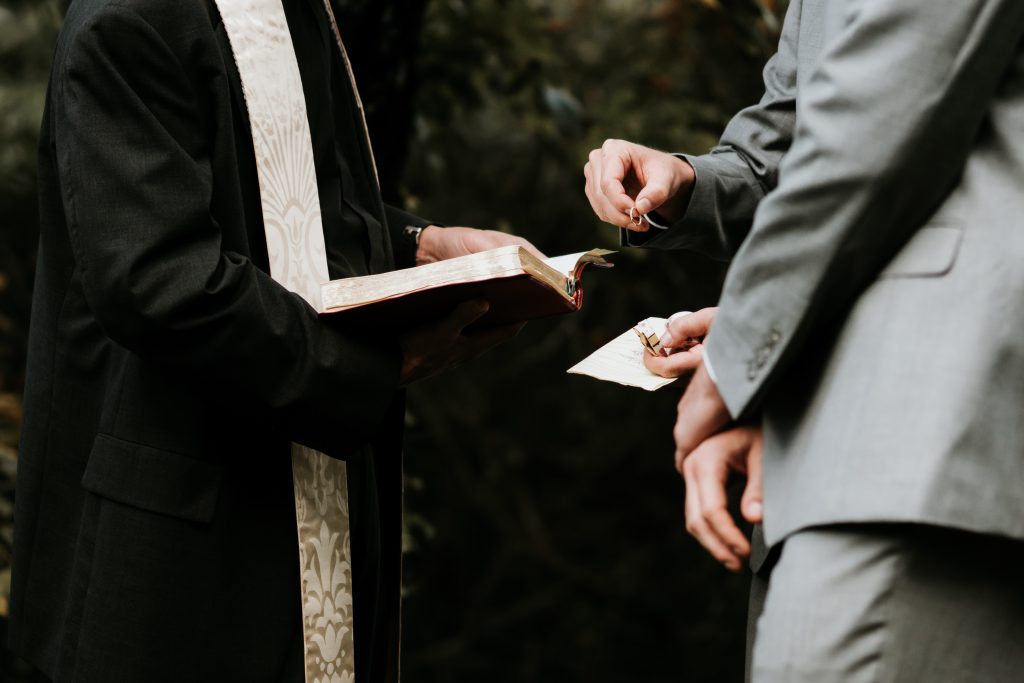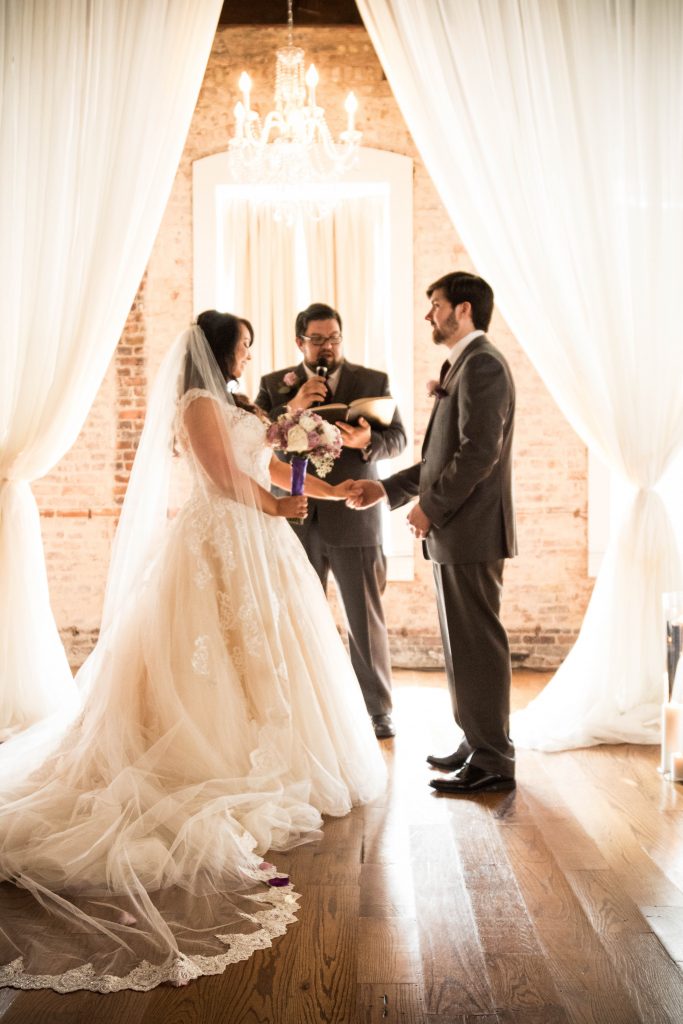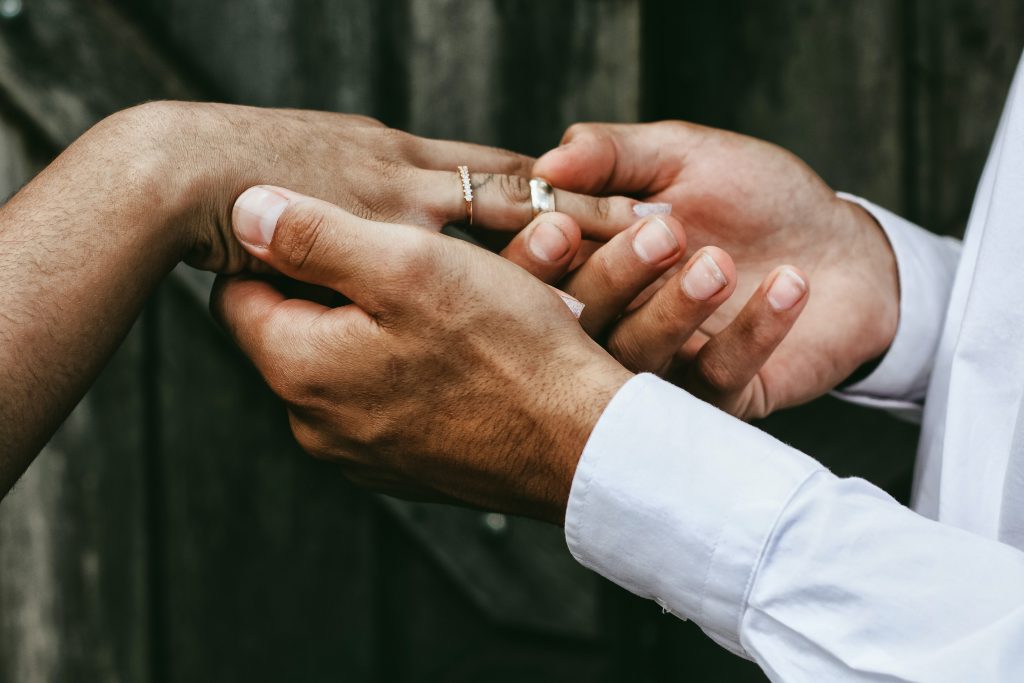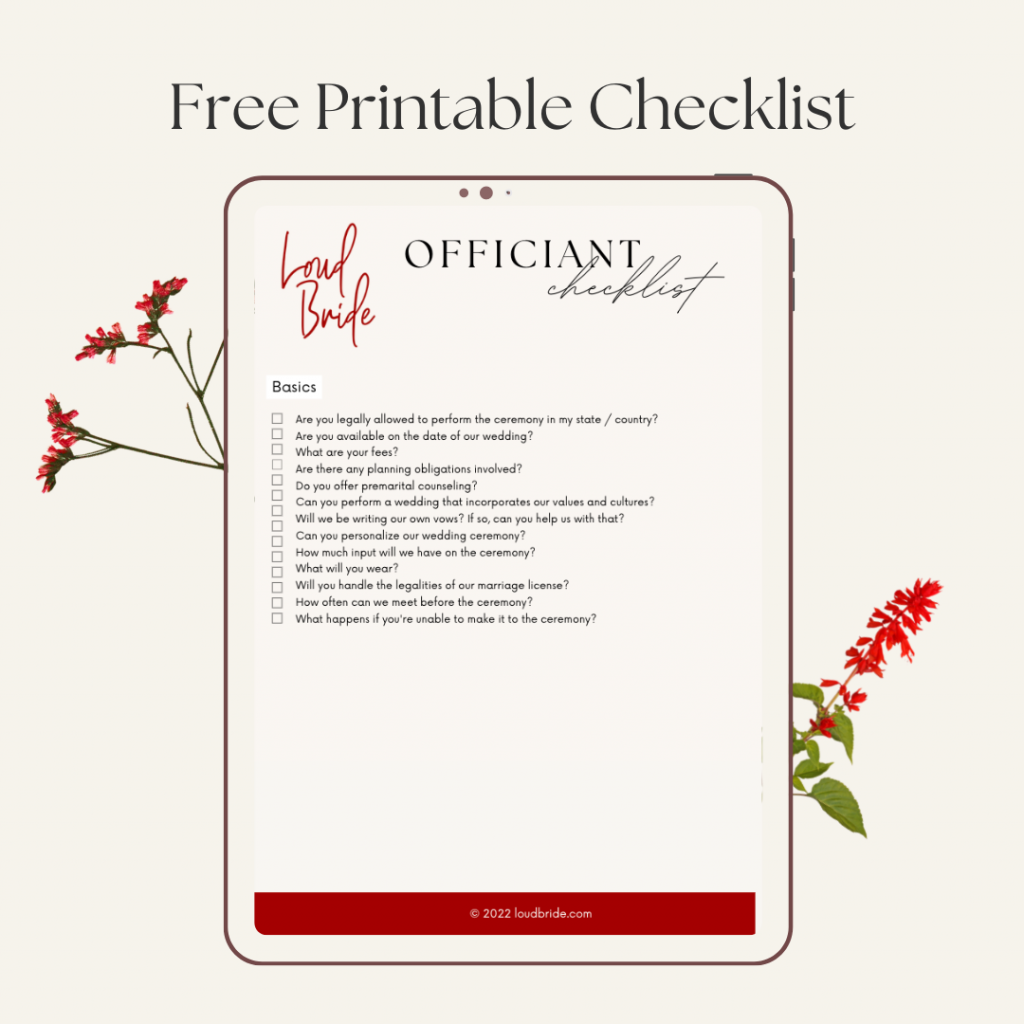
Most couples consider the ceremony to be the most important part of their wedding. The ceremony is where you affirm your love and commitment to your partner. Regardless of whether it’s in a church or backyard, in front of a hundred people or ten, your wedding ceremony is deeply meaningful. That’s why it’s important to choose the right officiant for your wedding.
I recently became a wedding officiant and have married two happy couples. These are the questions I consider essential to ask when booking and after booking your officiant.
What should you ask your wedding officiant?
The most important questions to ask your wedding officiant is to describe their wedding ceremony style, whether they’re available on your date, and how much they are charging for their services. Some officiants are locked into specific structures or locations, where others are more flexible to create a customized ceremony.
Questions to ask your wedding officiant fall into two categories: 1) Questions to ask before you hire your officiant, and 2) Questions to ask after you’ve hired your officiant.
Questions to ask before you hire your officiant:
The first category of questions are for interviewing your officiant to determine if they are a good fit for your wedding. These are the questions you’ll want to ask any potential officiants before you make your final decision.
Are you available on my wedding date?
Make sure your possible officiant is available on your wedding date. If you are getting married in a secular location, like a hotel ballroom or event space, you will likely book the venue before selecting the officiant. For those getting married at a church, synagogue, mosque, or other house of worship, your ceremony venue will likely include the officiant. Therefore, I recommend speaking with the religious officiant before booking that venue to make sure you are on the same page. If you are eloping, you and your fiancé(e) can hire your officiant before selecting the venue.
Speaking of elopement…
Do you offer elopement packages?
Many wedding officiants are one-stop shops for elopements. An elopement package usually includes a small or micro wedding ceremony (a micro wedding is less than 50 people – you can read more about micro weddings here.) with an officiant and some photos of your special day. Elopements can take place at outdoor locations like beaches and parks, or indoor locations like chapels. If you are traveling, your officiant can offer suggestions on great places to get married.
What kind of wedding officiant are you? What legal credentials do you have to certify a marriage?
There are four main types of wedding officiants: civil officiant, religious officiant, professional officiant, and friend/family officiant.
- Civil wedding officiant: someone who works in a government office and performs marriages as part of their job. Normally, you will not have the opportunity to interview a civil officiant.
- Religious officiant: pastor, rabbi, or other faith leader who performs marriages in addition to their normal duties at their organization.
- Professional officiant: a notary or otherwise State-authorized person who performs weddings for a living. Sometimes called a celebrant.
- Friend or family officiant: Someone you personally know and have chosen to officiate your ceremony. In my state, I was able to officiate a friend’s wedding after becoming a notary public. If you’re interested in this option, google your state and “become wedding officiant” to see how your loved one can become a wedding officiant.

Can you describe your ceremony style?
This question helps you understand what kind of wedding your potential officiant likes to perform. If you choose a religious or civil officiant, they are likely limited on how they can perform ceremonies. For instance, a traditional Catholic wedding is a mass inside a Catholic Church. A Catholic Priest would be unable to marry you on the beach or with unique vows. A professional wedding officiant is able to tailor a religious or secular wedding to your style. Although even a professional wedding officiant may have a signature style, so make sure to ask them!
Can we have a religious/spiritual/secular ceremony?
A professional wedding officiant can include aspects of both you and your fiancé(e)’s religions in an interfaith ceremony. They can include prayers or readings that are culturally significant to you. Religion not your thing? Talk to your officiant about writing a secular ceremony.
How much customization do you offer for wedding ceremonies?
Some officiants prefer to stick with one style of ceremonies, while others are happy to customize the ceremony for each couple. It’s more work for the couple and the officiant to create a custom ceremony, but it’s worth the effort if you want to put your own personal spin on things. Talk to your potential officiant to see if they need to stick to a script or are able to mix things up for you.
Can you perform a unity ceremony?
A unity ceremony is a ritual that symbolizes you and your fiancé joining into one family. It is one of the many ways you can customize your wedding ceremony to fit you and your fiancé. Some popular unity ceremonies include lighting a candle together, pouring different colored sands, or mixing a custom drink.
Can we write our own vows?
Again, some officiants won’t allow you to recite personalized vows, based on religious or civil limitations. If you envision writing your own vows for your partner, make sure that’s allowed.

How much do you charge to officiate a wedding?
Be sure to ask how much it costs for the officiant to marry you. A religious officiant may request a donation to their organization in lieu of a fee. A civil officiant may have a nominal charge on top of the marriage license fee. Professional wedding officiants vary in cost depending on your location and the length of the ceremony. If your family or friend is getting certified to officiate your wedding, it’s kind to offer to pay for their certification.
Is the wedding rehearsal included in your contract? Are there any additional costs, such as travel fees?
It’s not a universal practice for officiants to attend the wedding rehearsal. Don’t make any assumptions- discuss what’s included in the wedding officiant’s contract. You definitely don’t want any surprise charges the day of your wedding.
How many meetings do you have with the couple before the wedding?
When I officiate weddings, I like to meet with couples at least twice before their wedding. Once to get to know them and how they envision their ceremony and then again to rehearse the wedding ceremony. Some officiants want to meet more frequently to get to know the couple better or to offer premarital counseling. Other officiants may offer a phone consultation before the wedding and then not see you again until the special day.
Questions to ask when planning your ceremony:
The second set of questions will help you and your officiant plan your ceremony. These are important to ask after you’ve booked to iron out all of the details. And if you’re asking a friend or family member to marry you who doesn’t have a lot of experience with weddings, it’s doubly important that you go over some of these basics.
How long will the wedding ceremony be?
Wedding ceremonies are typically 20-30 minutes, although they can vary from about ten minutes to one hour. An elopement or simple courthouse wedding tends to be shorter, while a formal religious ceremony has more components and is lengthier.
When do I need to get the marriage license?
It is essential for the couple to get the marriage license in order to make their wedding legally recognized. Requirements vary from state to state, but your officiant should be knowledgeable about the process. If you are in doubt, look up the Court of Clerks website for your county.
Who is responsible for returning the marriage license?
Typically, the wedding officiant will return the marriage license to the Court of Clerks office. Depending on your state laws, you will have a limited amount of time to return the license. Make sure you and your officiant agree upon the details ahead of time so you don’t have to worry about running to the courthouse before your honeymoon.
Can the wedding officiant help with writing vows?
If you and your fiancé(e) are writing your own vows, your officiant might be able to assist with coming up with ideas or structuring your thoughts. Wedding officiants are well-suited for this task because they have heard many wedding vows before and have a way with words. If you are interested in them helping, ask if they are willing!
Do you have suggestions for readings?
The wedding officiant is a great resource for planning your wedding ceremony. If you’re not sure what to include in the ceremony, the officiant can offer some great suggestions for a beautiful ceremony.
How can we include other loved ones in our ceremony?
Some brides are choosing to involve friends and family in their wedding ceremony. This might look like having both parents walk you down the aisle, or having friends perform readings. If you are blending families, you might want to include your children in your wedding. Check out my guide here for including your children in your wedding.
What do we need to bring on the day of our wedding?
The officiant will likely tell you to bring your rings, vows, and marriage license. If you are doing a unity ceremony, you might be responsible for those supplies as well.
You also might want to review this list of commonly forgotten items on your wedding day to make sure you don’t miss anything. Check out the Loud Bride checklist for things to bring on the day of your wedding.
Do you provide microphones?
Logistics like this are easy to overlook. I got married in a backyard by my husband’s cousin. She is an experienced professional wedding officiant so she knew to bring a wireless mic for the ceremony. If the officiant isn’t planning on bringing a mic, talk to your venue and DJ about using their microphones well in advance of the ceremony.
What time will you arrive at the ceremony site?
Another logistical question for your officiant. When I officiate, I try to arrive 30-60 minutes early to account for traffic or last minute emergencies. I would be wary of an officiant that plans on arriving just before the ceremony. If they are late, the wedding will be late!
Looking for more information on hiring an officiant? Here’s a full guide on how much they cost, whether to tip them, and more.
More Checklists
Love a checklist? Here are some additional lists to check out as you interview vendors:

